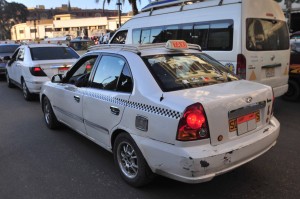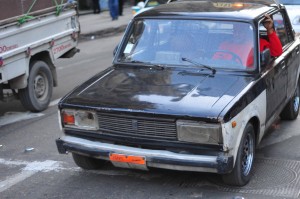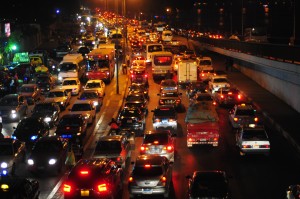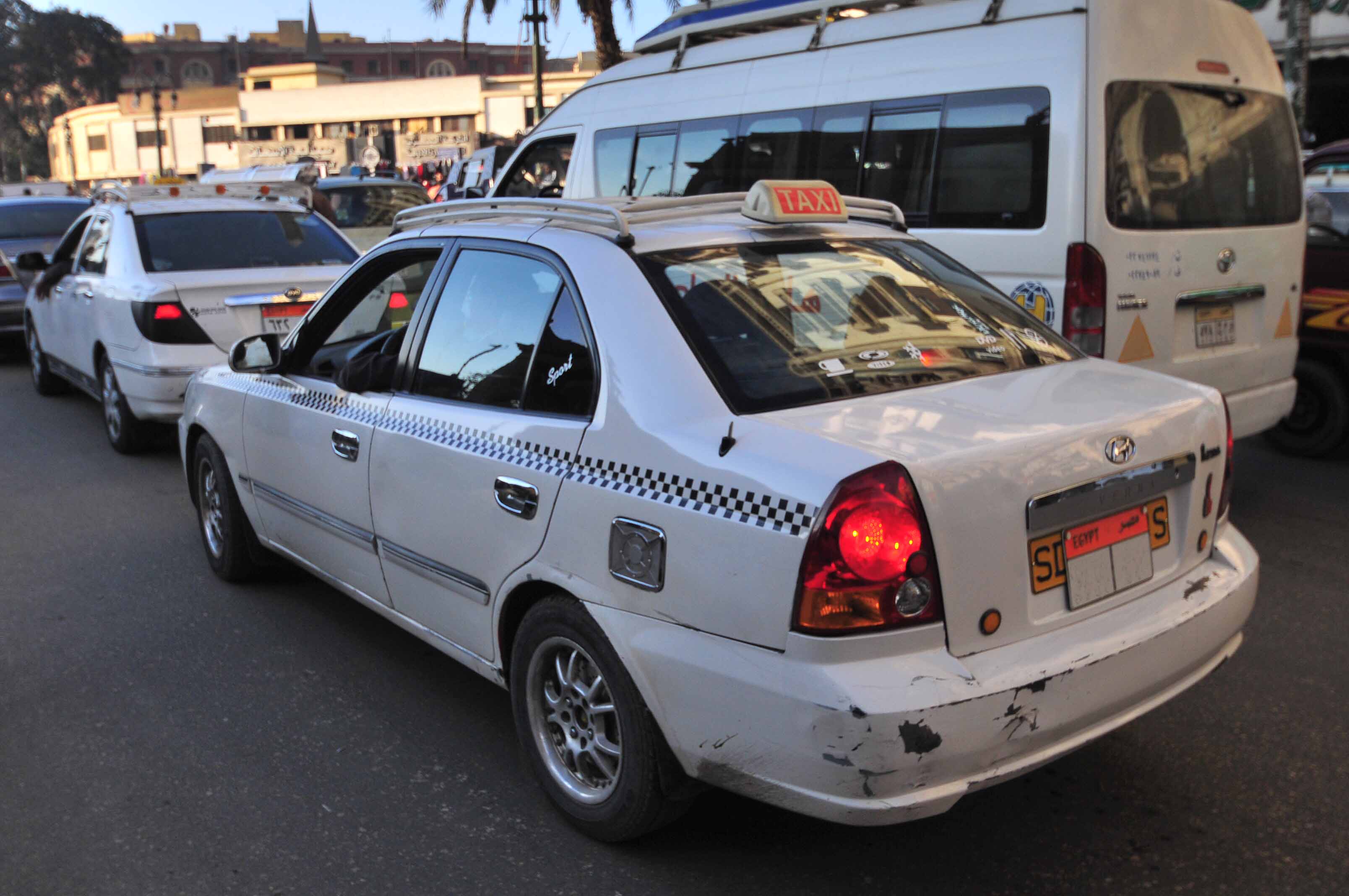
When Mamdouh El-Gendy, a business executive, got out of the cab, he kissed his car as he saw it in the service and maintenance centre. He had to take a cab to pick it up. “It is like they are living in another dimension,” said El-Gendy, expressing his frustration at cab drivers.
Though spotting a cab is easy in Egypt, just getting into one is on top of the list of problems facing people in the street. It is customary in Egypt, that when stopping a cab, citizens should inform the driver about their destination before getting in. It is very common that people will not get into the first cab which stops for them.
Engie Sherin, a training supervisor and coordinator had such an experience, bringing her to the point of tears, while trying to get a cab from Zamalek. “I counted them,” Sherin said referring to those who said no, “11 in a row.”
Once a person gets into a cab, it all begins. A lot of people feel taken advantage of by cab drivers. Frustration stems from cab drivers taking longer routes or claiming not to have any change in order to get more money. Others simply feel ripped off by the cab driver.
But there is more than meets the eye concerning the way in which cab drivers behave. Understanding what they go through, socially and financially, can reveal the reasons behind their behaviour.
Raw Deal?
In Cairo, the cab system works in two ways; owners of cabs either drive it as a direct source of income or assign someone else to it. The majority of drivers rent cabs. Drivers renting a cab, rather than owning one, are under a lot of pressure to collect enough money during their shift.
Usually, a cab owner assigns two eight-hour shifts per vehicle, with a driver for each shift. Each cab driver has to provide a prearranged amount of money to the cab owner at the end of the shift. Rental fees can stretch from anywhere between EGP 65 to 80 per shift.
Most of the white cabs in Egypt run on compressed natural gas (CNG) and not petrol. Each driver has to fill up the tank at the end of the shift, which is an extra EGP 10 per shift. The car also has to be washed, costing an additional EGP 10. Every working day, each cab driver has to have at least EGP 90 by the end of the shift. This is before the driver has made any personal income. “There are days where I end up paying for the shift out of my own pocket,” said Hassan, a cab driver in Dokki.
Ahmed El-Sunni, a 49-year-old cab driver, said that such relationships differ from owner to the next. “Cab owners, who were or are still drivers, usually exhibit empathy and are not that strict about the shift fees,” El-Sunni said, “but there are others who are”.
Ahmed Ali El-Agamy, father of three daughters, works two shifts in order to make ends meet. “The owner agreed to give me the two shifts for a lower rental fee, around EGP 140, but his condition was that I will not take any holidays,” said El-Agamy. On average he returns home with EGP 40. With one of his daughters studying in her 3rd year at the Faculty of Arts, along with two others still in school, El-Agamy cannot depend on working only one shift.
Then why does a cab not stop?
There are collective reasons why cab drivers do not usually take customers. Firstly, it could be the end of a shift, the cab driver is on the way to drop off their car, and the person’s destination is out of the way of the driver’s route. Some cab drivers schedule an appointment with a customer, which is guaranteed income, so they only take customers whose destination is along the same route.
Focused on having to collect enough money in eight hours, some cab drivers behave irrationally. They refuse to take people if the fare is going to be low. However, the probability of making more money is higher if the driver picks up every customer he comes across.
Fekry Abu Karim, a cab driver from Nasr City, said, “They will not take a person whose ride will bring in five pounds, but will rather wait for another person whose ride will bring in more money.” Abu Karim, like many other drivers, believes that this is not an appropriate approach to adopt. Having faith in God, they believe they should accept the livelihood presented to them. “One should work hard and should not reject opportunities and God will give us a livelihood,” he said.
Recently, fear has hindered many cab drivers from making more money. Eslam, a cab driver from Giza, said, “first we used to pick up anyone and go anywhere, but lately we have to be picky regarding the customers and the places we go to.” Drivers say that carjacking incidents have increased on the ring road, during the past two years.
As a result, drivers prefer not to drop people off in remote areas. “I do not know what could happen to me there,” Eslam said, “a group of thugs could attack me on my way back and steal my car, I’ll be lucky if they do not kill me.”
Several drivers shared stories of a similar nature whereby a group of armed men would attack a cab but won’t shoot if the driver is cooperative. They take the car along with the driver’s phone and then leave. A few days later, the carjackers will contact the driver and demand around EGP 20,000 in return for the car.
Around two months ago, El-Agamy’s friend was driving through El-Omraneya, where he was stopped by a group of people wearing suits. They requested to be dropped off at Helwan. “They pulled out their guns and high-jacked the car,” said El-Agamy. A week later, they called him and told him they wanted EGP 15,000 in return for the cab. “And they told him, that if he told anyone, he would not see his cab ever again,” said El-Agamy. He paid them and got his cab back.
Another common issue troubling cab drivers is traffic. A World Bank study issued in November 2010, highlighted traffic congestion as a serious problem in the Greater Cairo Metropolitan Area. According to the study, traffic congestion has adverse effects on, but is not limited to, personal travel time and vehicle operating costs.
El-Sunni and Hassan clarified how traffic affects the amount of money cab drivers make per day. “I have a family to take care of, and I have expenses,” El-Sunni said, “if I get stuck in a traffic jam on the 6th of October bridge for an hour or two, then I will not be able to collect the shift fees, or bring in enough money for my family that day.” For the drivers, passing time without a passenger in the car is time wasted from their scheduled shift and therefore money lost.

No other choice
There are a surprising number of drivers with University degrees, who have had to resort to being a cab driver. Alaa El-Din Hussein, graduated from the Faculty of Islamic Call at Al-Azhar University in 1986 and works as a cab driver. “I have not had a job until today,” Hussein said, “I am 50 years old, I had to learn some skills in order to live because if I did not do so, I would have been locked up in an mental asylum.”
Coping with financial burdens, some people have sought becoming cab drivers as a second job. Several cab drivers in their 20s shared similar stories where they acquired university degrees, but cannot make a decent living.
Young people who want to marry are caught between a rock and a hard place, of not finding a suitable job or finding a job with a low salary. They work two jobs in order to overcome the obstacles formed by cultural norms. If they approach the family of the bride just as cab drivers, or even cab owners, they will be rejected for not having a governmental job that provides stable income, insurance and pension. If they approach the family just as a temporary government employee, who makes around EGP 400, they will be rejected too.
Judged?
Many cab drivers are considered inferior by certain segments of the community. Before the uprisings, drivers felt humiliated by police officers at checkpoints. In fact, El-Sunni said some drivers were unfairly judged and got into trouble for no reason at all. He suffered an incident from childhood that was to haunt him later on.
When he was a child, he was viciously attacked by a dog in the street just above his right eye. After two surgeries, his eye was saved, but he was scarred for life.
“Officers used to treat me as if I was a thug because of my scar,” said El-Sunni. He was once stopped by a patrolling officer, a couple of years ago, who wanted to conduct a background check on him. “I told the officer to take my national ID card and conduct his background check, so he would believe that I had no criminal record,” El-Sunni said. But the officer insisted on taking him to the police station.
As El-Sunni entered the station, he was taken into an office. “There were people in there, who were handcuffed to the wall,” he said. El-Sunni, refused to be treated like a criminal, especially as he had done nothing wrong. They left him in the room, but did not handcuff him. A few hours later, an inspector came into the room and was shocked to see El-Sunni inside. “Inspector Qandil knew me personally and he wondered what brought me to the station,” said El-Sunni. The inspector was deeply disturbed by the incident. El-Sunni said, “The inspector, offered me a drink and called in the officer, explaining to him how it was wrong to deal with an old and respectable man in such a manner.”
Victims of bureaucracy
Despite drivers appreciating the change in the way they are treated at checkpoints, they are intensely frustrated by the routine of the procedures at the Traffic Department. Ahmed, a cab owner and driver, despises the exhausting and time-consuming routine he has to follow when completing his cab’s registration papers.
The former lawyer said, “I am supposed to do my cab papers in El-Hawamdeya Traffic Department”. When Ahmed went there, he was surprised by the official who told him that his residential area had been transferred to Nikla Department. “I went there so that they could check the car,” Ahmed said, “then match the engine’s number back at El-Hawamdeya, in addition to getting the certificate of traffic offense from El-Abaseya Department.” He spent three months just following these procedures.
Ahmed expressed his distress about the loss of income over these three months. He believes that, in addition to consolidating all procedures into one department, something as simple as adding a few pounds to the registration fees in return for recruiting more officials, would facilitate the process of getting the paperwork done a lot quicker.
As a cab owner and driver, Ahmed’s tone was filled with agony as he said, “I have expenses which include taxes, insurance, services, maintenance, gas in addition to taking care of my family,” he added, “we need to cover these expenses and not face more stress.”
Black and white

Ramy, a language institute graduate, faces a different kind of stress. Before becoming a cab driver, he had worked as a reception manager of a hotel in Sharm El-Sheikh and started his own private car rental business. Ramy said the number of tourists who visited his hotel drastically decreased over the past two years. “We all depend on the tourists,” Ramy said referring to the importance of tips and commissions.
With the instability of the tourism industry, along with the high cost of living in Sharm El-Sheikh, Ramy had a hard time keeping up with his family’s expenses. Running a car rental agency was not paying off either. “We decided to move back to Cairo, three months ago,” said Ramy. His friends suggested being a cab driver.
But Ramy does not drive the popular white cab, he drives the black one.
Roaming the streets of Cairo are the new white cabs and the old black ones. In 2009, the Ministry of Finance, with support from the prime minister, initiated the Vehicle Scrapping and Recycling programme targeted at Greater Cairo. Cabs older than 20 years were not deemed road worthy. The old black cabs were replaced but some still exist. An Energy Sector Management Assistance Programme report, issued in 2010, estimates a number of 45,000 to 50,000 cabs that were older than 20 years old.
The programme intends to improve air quality, reduce greenhouse gases, as well as provide Egyptians with better employment opportunities.Owners of black cabs were required to hand them over in return for EGP 5,000 and a new white cab. Installments are facilitated in a manner not to burden the owner.
Ramy’s rental fee is EGP 50, because black cabs attract fewer customers. “People prefer stopping a white cab now, so we work less,” said Ramy. He has no problem covering the rental fees but does not make enough money to support his family.
Though Ramy thinks people prefer stopping a white cab instead of a black one for luxurious reasons, it is more likely to be an issue of avoiding quarrels. Before 2009 and the emergence of the white cabs in Cairo, the black ones dominated the streets. Such cabs where not governed by specific fares or a meter, which caused constant problems between passengers and drivers. Abu Karim, summarised the situation saying, “A greedy driver used to ask for more money and a miserly passenger always wanted to pay less.”
People were not used to taking white cabs at first, but with time they realised that interacting with a white cab is much more convenient. “There is meter with a fixed fare rate, no space for quarrelling, so people prefer taking white cabs now,” said Abu Karim.
Not very white
Upon opening the door, the meter charges EGP 2.5 which covers 1km, and then every 200m is 25 piastres. The meter also measures the total number of stops made during the ride in terms of seconds; every 60 seconds costs 25 piastres. Cabs with meters and fixed rates make people think that using a white cab will save hassle with fares, but apparently, customers can still be ripped off by the meter.
A lot of foreigners are exploited, by what drivers call “tourist rates.” The meter is working, it counts, but at a different rate. Ibrahim El-Sayed, a driver and owner of a white cab, justifies this action, “do foreigners checking in a room at a hotel, or entering a touristic place, pay the same price as that charged for Egyptians?” he asked. He sees it as a fair opportunity for cab drivers in harsh economic times.
People may have the impression that cab drivers have the legal right to do this, but there is no such thing as a “tourist fare” and it is in fact, illegal.
There are two types of meters in white cabs, a red digital meter and a green one, marked by a horse running on the screen. Abu Karim said that green meters can be altered, but not red ones. “Dishonest drivers, go to someone who cracks the meter and rewires it in a manner that gives them the capacity to click on a button that changes the rate,” said Abu Karim.
Even Egyptian citizens fall victims to this scam. Abu Karim said, “these dishonest drivers, when they realise that the passenger is unaware of it, they click on the fake fare button while shifting gears.”
Inevitably, some drivers want to collect money in ways deemed unethical and others annoy passengers with their bad attitude. However not all are the same. Understanding what drivers endure reveals how cab drivers are fervently trying to cope with hardships in their lives. The stories shared by cab drivers do not specifically represent cab drivers only; they represent a segment of society striving to make a decent living whilst trying to raise a family.



